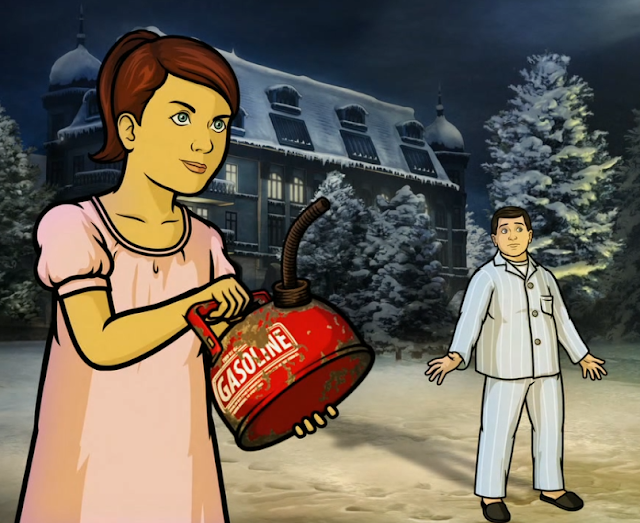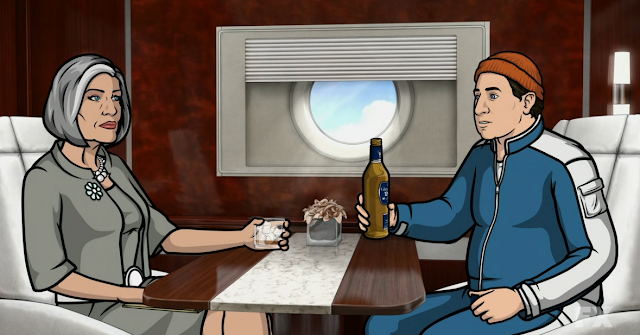Jurassic Park, which stomped back into theaters a couple of days ago in a 3D-converted 20th anniversary edition, conquered the box office in the summer of 1993. But that summer, because I was at that time a fan of A&E's reruns of
The Fugitive, David Janssen's
noirish,
anti-authoritarian show from the '60s, I was more excited about--and ended up more enthralled by--a different blockbuster, director Andrew Davis' film version of
The Fugitive. Sure, dinosaurs are cool, but white-knuckle,
non-CGI-assisted action sequences involving narrow escapes from bus-train collisions and spur-of-the-moment swan dives from dams into waterfalls are cooler.
So are both Harrison Ford in the role of Janssen's memorably laconic and twitchy Dr. Richard Kimble (perfect recasting) and Tommy Lee Jones' entertaining reinterpretation of Gerard, who was
a much more unlikable and humorless cop on the original series (Jones won an Oscar for his work, and let's pretend
U.S. Marshals never happened). Blink and you'll miss Neil Flynn as a transit cop in a scene that
Scrubs later used as
a clever gag about the murky past of Flynn's nameless janitor character on the show. A not-as-tiny element of
The Fugitive is James Newton Howard's original score.
The first score that Howard composed for a blockbuster is a pretty decent score with a couple of terrific cues. "Helicopter Chase" is the same theme that Debbie Allen's dancers performed a bizarre interpretive dance to at the 1994 Oscars (a moment that elicited snickers from many TV critics, including then-
New York Times film critic Janet Maslin, who cracked, "Who ever said the score from
The Fugitive had a good beat? Who said you could dance to it?"). The other standout cue is "It's Over/End Credits" (the theme for Kimble during this cue was
later recycled by composer Louis Febre in CBS' 2000
Fugitive reboot with Tim Daly as Kimble and William T. Michaelson, er, Mykelti Williamson as Gerard).
In 2009, La-La Land Records released an expanded edition of the
Fugitive score and corrected a huge audio mistake on the previous release of Howard's score, which nobody outside of Howard and his fellow musicians would have noticed (someone accidentally reversed the left and right channels on all the tracks). The booklet art on this two-CD La-La Land set is strange because it doesn't contain a single photo of Jones' craggy face and is filled with pics of the One-Armed Man, for the two people out there who are fans of the One-Armed Man. DVD producers can't clear pop songs on box sets of TV shows without ponying up an arm and a leg, and now movie stars' faces inside soundtrack album booklets can't be cleared either?

Though I enjoyed the 1993 film, I never got around to copping the 2009 release until a few weeks ago, when La-La Land posted that the album will go out of print in April. Selections from the now-out-of-print album are now part of the "AFOS Prime" playlist, so you don't have to search every warehouse, farmhouse, henhouse, outhouse and doghouse to hear some of this album.
***
The Fugitive made great use of Chicago locations--
that St. Patrick's Day parade where Kimble hid from Gerard wasn't in the script and was an event Davis, a Chicago native, received permission to shoot in at the last minute--but that's not the only reason why the late Roger Ebert, who was also a Chicago native, loved the film and considered it "the best of all the summer thrillers" that dropped in 1993.
 |
| (Photo source: DVD Beaver) |
The louder parts of Jones' Oscar-winning performance are what everyone from Scott Glenn in
a 2008 Monk guest shot to more recently,
Tim on Justified imitates or quotes from (and by the way, Tim was referencing a movie
Justified cast member Nick Searcy appeared in), but the quieter parts of Jones' performance were also fascinating to Ebert. "As the chase continues, [Gerard] gradually becomes convinced of the innocence of his prey," wrote Ebert, "but this conviction is wisely never spelled out in dialogue, and remains ambivalent, expressed in the look in his eyes, or his pauses between words."
The original series was notable for delivering exposition through opening voiceovers by narrator William Conrad, which 2000
Fugitive series showrunner John McNamara said were a holdover from radio in
an Entertainment Weekly article about the 2000 reboot. The film ditches the narration and avoids having characters deliver infodumpy dialogue, except in believable situations where minor infodumps are called for, like in Gerard's famous "Our fugitive has been on the run for 90 minutes!"
speech to his team. As Ebert observed, the characters instead gradually reveal the way they are thinking, mostly through their facial expressions.
"
The Fugitive has the standards of an earlier, more classic time, when acting, character and dialogue were meant to stand on their own, and where characters continued to change and develop right up until the last frame," wrote Ebert at the end of
his four-star review of the film.
Ebert himself was a writer from an earlier, more classic time, when the newspaper industry that he and
Gene Siskel emerged from wasn't in shambles and film criticism was everywhere on TV. Both lovers of all things Chicago and haters of deep-dish "Chicago-style" pizza (I agree with their opinion of "thumbs down" regarding that kind of pizza), Siskel and Ebert pioneered the movie review show format of two critics debating each other. It's a format that, frankly, sucked when Siskel and Ebert weren't the critics debating each other because "the original frenemies," as one of Ebert's
Chicago Sun-Times colleagues referred to the duo in
an oral history about their friendship, were the only ones who were great at it on-screen.



























